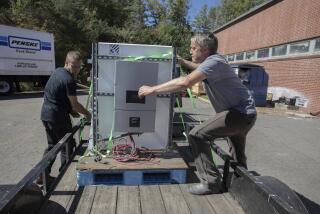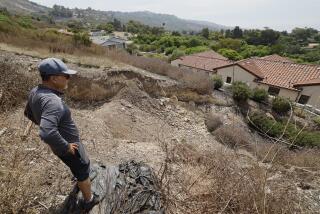Empowered, but Lacking Electricity
BAGHDAD â The situation in Iraq is such that every good thing that happens seems to have an accompanying bad.
Consider, for example, television. In Saddam Husseinâs Iraq, satellite dishes were a forbidden fruit. Now the walls are down, and the world is rushing in. In order to catch it, satellite dishes in a perplexing variety of sizes and quality are on sale on what seems like every street corner in Baghdad.
With them, one gains a brand-new view of the world. Provided, of course, that they are hooked up to televisions that work.
Thatâs the accompanying bad: TVs, like almost everything else in the modern world, require electrical power to run. And at the moment, one of the scarcest commodities in Iraq -- especially in Baghdad -- is a dependable source of electricity.
Iraq has had chronic power shortages for more than a decade. In 1990, the countryâs total generating capacity was estimated at about 9,600 megawatts. Half that capacity was wiped out in the 1991 Persian Gulf War. What was left was a patchwork of old plants and, in many cases, older transmission lines. For the most part, nothing has been added since.
âIt was decrepit, producing at half the levelâ of the period before the Gulf War, said Thomas Wheelock, a project manager for the U.S. Agency for International Development in Baghdad. âIt was held together with chewing gum, rubber bands and the ingenuity of the Iraqi engineers.â
The United Nations estimated that production capacity had dwindled to 4,400 megawatts by last summer.
That was before this yearâs war. Although physical infrastructure was not as heavily bombed by the U.S. as in 1991, some of it was struck. But the rampage of looting after the fall of the government did more damage than the war.
Pieces of the infrastructure have been found for sale as far away as Istanbul, Turkey. British military forces in the southern Iraqi city of Basra recently confiscated a copper smelter and tons of copper that had been stripped from transmission lines. Theyâve also found barges full of copper being smuggled out of Iraq through the southern seaways.
Ian Pickard, a spokesman for the Coalition Provisional Authority in southern Iraq, said investigators there have concluded that in addition to the war and looting, there has been a concerted effort to sabotage the infrastructure.
âThere was a demolition plan,â he said. As members of Husseinâs Fedayeen Saddam militia âmoved out, they destroyed key sites. It wasnât clear at the time. Itâs clear now. It was systematic, and it was planned.â
The cumulative effect of all this shut down the power grid.
âBy April, production was zero,â Wheelock said.
In the first two months after the war, as much of the old system as could be used was put back on line. Production was back to an estimated 3,300 megawatts by the middle of June, when transmission lines, oil pipelines and electric workers were hit by a wave of attacks.
The assaults occurred just as the summer weather arrived in full blast-furnace effect. The sabotage and the increased demand for electrical power, mainly for air conditioning and refrigeration, overloaded the fragile system and sent two-thirds of the country tumbling into darkness -- a very warm darkness.
For several days, the production at key plants in Baghdad was nonexistent.
âWe were completely shut down,â said Bashir Khalaf Omar, director of the Baghdad South Power Station. In the midst of the blackout, he was reduced to crawling through the plant to try to determine how to get it restarted.
Still, in recent weeks, much progress has been made. The northern and southern sections of the country are back up and running. Baghdad, which produces less than a tenth of the nationâs energy and consumes more than half, has been hit harder. On an average day, most of the capital has no power half the time.
âItâs basically three [hours] on and three off,â Wheelock said.
This while average daytime temperatures are well over 100 degrees. Many nights it has âcooledâ to about 90 degrees. People cope as best they can.
They wave fans over blocks of ice -- manual air conditioning, they call it. People sleep on rooftops.
Nearly every conversation -- no matter where it starts -- soon turns into one about electricity. People repeatedly say they cannot fathom how the U.S. with all its might cannot perform what they see as the simple act of repairing electric plants.
âWe hoped the coalition would get electricity back the first week,â said Ali Hussein, a teacher.
âTheyâre old plants,â Wheelock said. âBecause of a lack of spare parts, lack of maintenance and decades of disinvestments, not much of it is salvageable.â
In many ways, Baghdadâs powerlessness is a political decision. Natural gas plants in southern Iraq and hydroelectric plants up north produce most of the countryâs electricity. In the past, by decree of the old regime, those two regions exported much of their production to Baghdad.
As a result, Baghdadâs 5 million people almost always had power. Meanwhile, the other 19 million Iraqis almost never had a day without blackouts.
Perhaps the only man in Baghdad who is not discouraged by the events is Tugrul Topcu, who, with his soft, rounded features and diffident manner, hardly seems the sort of man who would delight in othersâ misery
But business is business, and Topcuâs business is very good. He sells power generators for a Turkish company, Aksa, that was among the first to seize on the opportunities presented by the faltering infrastructure.
Aksa rushed Topcu into Baghdad almost the moment President Bush declared an end to major hostilities.
He initially had much of the market to himself, but competitors have descended, and the city is awash in the rattle of small generators. Alleys are tangles of power lines where people have hacked into a neighborâs power supply.
Still, business has been very good, he said. âWhen electricity is cut down,â he said, âthe price goes up.â
More to Read
Sign up for Essential California
The most important California stories and recommendations in your inbox every morning.
You may occasionally receive promotional content from the Los Angeles Times.










